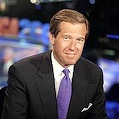Bush under fire: Network newscasts make it plain in coverage of Iraq Study Group's report
12/06/06 10:29 PM



By ED BARK
The broadcast networks' three flagship newscasts posted their anchors in Washington Wednesday for some sobering show and tell on the war in Iraq.
It reinforced both the importance of the day's news and the imprint of America's dinner hour newscasts. Cable news obviously is more immediate, as is the Internet. But for a solid meal and a civil conversation, keep turning to the NBC Nightly News, the CBS Evening News or ABC's World News.
They're still simply the best at distilling and imparting information that really matters. Antiquated they're not. Fair and balanced they try to be. If that's a revelation, then that's a shame. Too many people dismiss their relevance in an information age that increasingly feeds on crap. Brian Williams, Charles Gibson and Katie Couric resolutely want us to eat our vegetables.
Yes, Couric has tried to mix in a little cotton candy since taking over the Evening News in early September. But none of these newscasts are even remotely guilty of substance abuse. They've left that to the local newscasts and cable's growing legions of news blowhards and provocateurs.
Topic A on Wednesday's network newscasts was the long-awaited release of the bipartisan Iraq Study Group's report to President Bush and the nation. It wasn't pretty, and the anchors certainly didn't try to make it so.
The report "read a bit like a report card on the Bush administration's conduct of the war," Gibson said at the top. "And the marks were not good."
Williams labeled it a "grim assessment" while Couric began with the news that 10 more U.S. soldiers had died in Iraq on Wednesday. She then personalized the report's potential import: "With each death, with every passing day, so many of us ask, 'Is there any way out of this nightmare?' "
The Study Group's co-chairmen, Republican James A. Baker III and Democrat Lee Hamilton, provided plenty to chew on in both their public remarks and during individual interviews with all three anchors.
Baker hit one nail squarely on the head. The Iraqi people "have been liberated from the nightmare of a tyrannical order, only to face the nightmare of brutal violence," he said at Wednesday's official presentation.
More than two-thirds of each newscast was spent on the report's findings, recommendations and reactions to same. U.S. troops in Baghdad weighed in, as did citizens back home. Baker, for his part, was bluntest during his interview with Couric.
The newly installed Iraqi government must know that "we could bug out of there" if chaos continues, he said. "We have a damned difficult situation on our hands, and we need to deal with it."
CBS analyst Bob Schieffer, still a force on the Evening News, made the boldest prediction of how Bush will react to the Study Group's tough love proposals.
"You're going to see American troop levels begin to be cut next year," he told Couric. "The President's going to do that. Will it work? Who knows? But I think at this point he really has no other choice."
Wednesday's newscasts differed strikingly from one another only in the way they ended.
NBC's Williams briefly interviewed largely overlooked Republican congressman Frank Wolf of Virginia, who championed the idea of forming a bipartisan group to look long and hard at Iraq.
"So you feel good today?" Williams ask rhetorically. Yes, he did.
CBS ended with reporter Cynthia Bowers' interview of a tearful Illinois mother whose son was killed in Iraq two months after his unit had been scheduled to leave.
ABC's Gibson tried a little peace on earth, closing with a shot of the just-lit White House Christmas tree.
When he covered Congress, "I always loved the lighting of the tree," he told viewers. "Political arguments are forgotten. All members of Congress joining in the joys of the season."
Yes, the three network newscasts have their faults. On Wednesday, none of them were readily apparent. Content-wise, their best days are still in the here and now. Every once in a while we should give them credit for that rather than always writing their obits.
